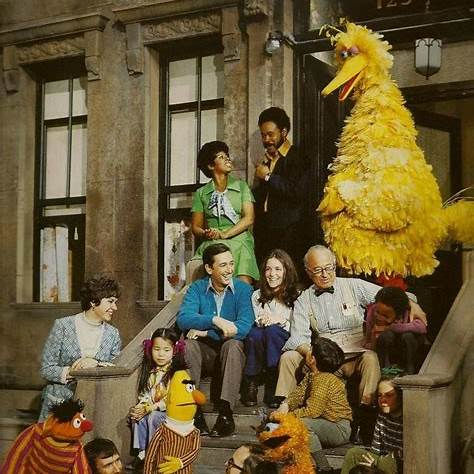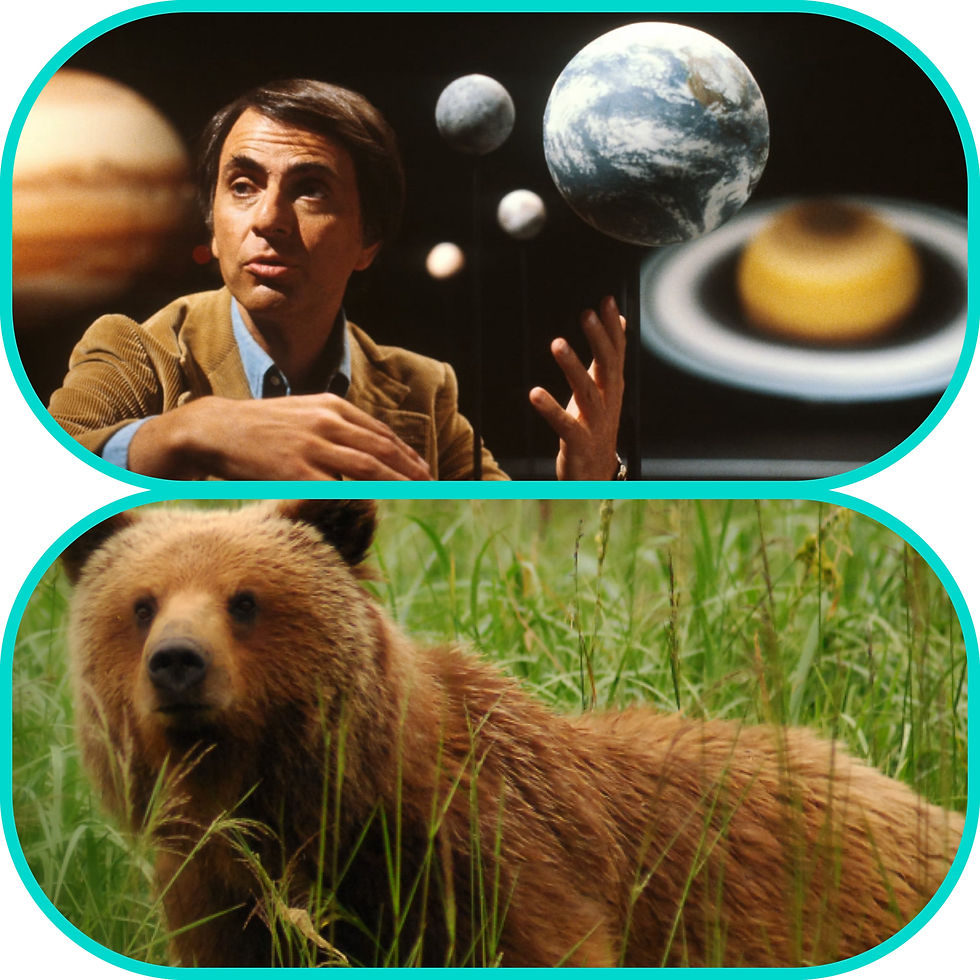Raised by PBS
- Meridith Byrne
- Jul 18, 2025
- 7 min read
How Public Broadcasting Shaped Me — and the Cost of Its Defunding
Last night, Congress ended funding for the Corporation for Public Broadcasting.
Maybe it was just a budget line. Or maybe it was part of POTUS' revenge agenda - politically expedient, ideologically satisfying to those who believe that education and empathy make people harder to control.
If so, they’re not wrong. PBS made me. And I’m certainly dedicated to slowing or stopping the ascendency of those who would bury compassion under capital.
Viewers Like Me
I was born in the mid 70s just seventeen months after my brother was killed at age 7 in a tragic auto accident. (My mom and sisters, then ages 8 and 9, were also in the car and survived the crash.)
This tidbit matters because after nine months of gestating in liquid grief hormones, I was born to parents and siblings deep in mourning. My whole world was shaped by other people's loss - that I had been brought in to fix, or so I believed. It didn't take long to realize I was inadequate to the task of replacing my brother.
And still, I was loved, and I was wanted. I really was. I know it.
But the beautiful family that loved me and raised me was in raw pain - grownups and children both - endeavoring to contain grief with one hand and claw towards healing with the other. Then came the miracle that was me: sensitive, intense, and bright - neurodivergent before that was a word.
I didn’t always fit into my household, my neighborhood, my school.
I was too much, too soon, too often.
When no one knew what to do with me and my questions, they turned on the TV.
Boston Presents: WGBH
Over the years, I watched a lot of television. A lot. But PBS came first and built my foundation. LeVar was my teacher; Mister Rogers, my guide; Susan and Gordon, my co-parents.
When the real world was too rushed, consumed, or annoyed to deal with me, PBS spoke slowly, made eye contact, and waited for me to catch up. It explained things - feelings, friendships, loss, logic, and language - with gentleness and respect.
It's fair to say that the Corporation for Public Broadcasting contributed heavily to my moral and intellectual development.
The Boston affiliate, WGBH, was the portal to that learning.
Television Worth Watching
I would like to introduce you to some of my favorite early-learning shows and share what each meant to me. It feels fitting to do so in this American moment. So get ready to deep dive into my uniquely Gen-X experience, heart, and mind.
Sesame Street - "Chasing the Clouds Away"
I started my days with Sesame Street in the Mr. Hooper era, before the polish and merchandising and the Tickle-Me-Elmo craze. On my Sesame Street, a child could ask hard questions, and adults would answer them with respect.

The street itself was little like my waspy, upwardly-mobile suburban neighborhood. I didn’t have the word diversity yet, but I knew instinctively: If I lived on Sesame Street, I might not feel so alone. The friends who lived and played there were black, brown, white, disabled, accented, bilingual, and beautifully normal. There was room for everyone.
My favorite character was Mr. Snuffleupagus. He was Big Bird’s best friend, but no one else could see him for years. And still… the adults didn’t shame Big Bird. They didn’t tell him to grow up. Eventually, they just believed him. They accepted Snuffy was real because they trusted the heart that saw him.
I craved that kind of emotional safety more than anything, and Sesame Street let me taste it. When Mr. Hooper died, they didn’t lie. They told Big Bird the truth, and they told me, too. I remember my parents and sisters sat and watched that episode with me, in solidarity I suppose. It was the first time I felt connected to them in their massive grief.
Mister Rogers - "It's a Good Feeling"
No cap - Fred Rogers was a cardigan bedecked badass.

He didn’t need special effects or a laugh track. He just sat there in this gentleness from which he told me I mattered. Not for what I achieved, or how well I behaved. Just ... because I was. He taught me I was lovable and worth listening to. That feelings weren’t shameful. That respect had power.
Mister Rogers provided me with routine, so I always knew what to expect when the people around me had unpredictable energy and iffy tolerance for my me-ness. I was safe from the shoe change through the trolly ride to Make Believe, the visits from interesting neighbors, the feeding of the fish, and the final zip of the jacket.
Mister Rogers taught me self-esteem. He taught me that the world is full of simple joy.
He taught me that every human has inherent dignity.
I loved that man. He taught me I could love myself.
Reading Rainbow - "I Can Go Anywhere!"
Child-Meridith read like she breathed. Constantly and for sustenance.
LeVar Burton loved reading as much as I did! And so did the real kids who did book-talks each episode of Reading Rainbow. They handed me stories like keys which I used at the library to unlock new adventures for myself. Every episode felt like an invitation, and I accepted.

Reading Rainbow taught me that literature can be a community experience, and that mindset still informs the way I teach - with time to get lost in pages, with book talks, student reviews, and discussion groups. Stories are meant to be shared.
LeVar expanded my schema with his adventures, providing context that helped me feel how each story connected with the world and my life.
Like butterflies in the sky, we are transformed by books. Reading Rainbow validated what I already sensed: stories make us human.
Mathnet and 3-2-1 Contact - "When Everything Happens!"

Before (otherwise excellent) teachers (who didn't know to accommodate me) told me I was careless - or required tests that prioritized memorization over wonder - I loved math, and I loved science.
I could (and still can) see patterns others miss and connect ideas with ease, but I got (and still get) lost in details: I forgot steps; I flipped numbers; I got distracted.
Before I learned to be ashamed by mistakes and to believe that I was bad at math and science, I learned to be curious and amazed through PBS shows like Mathnet and 3-2-1 Contact. This learning didn’t demand perfection but invited participation.

These wonderful shows communicated big concepts through storytelling. They asked questions and encouraged me to do the same. They modeled curiosity as valid intelligence. They showed me how my brain could work when it was given tools instead of tests, possibility instead of pressure. They taught math as a riveting mystery to be solved. They taught science as a mindset of wonder.
Looking back, Lisa, Marc, and Trini also taught me how I learn: through narrative, connection, and real-world relevance. They accommodated for my brain before anyone else knew to do it or even name it.
I still believe education can be like that, which is what I fight to achieve for my kids and yours every day.
Cosmos and Nature - "Where We Came From."
Neither of these shows was made for kids, but they were made for the intellectually curious. And I sat there criss-cross applesauce, eighteen inches from the screen, and ready to sponge it all up.

Cosmos gave me awe.
Carl Sagan’s poetic narration cracked something open: the idea that we are stardust, that the universe is beautiful.
Nature gave me reverence.
It showed animals grieving, families surviving, ecosystems relying on each other. It was where I first learned about interdependence, the magnificence of this world we share, and the miraculous creatures with whom we share it.
To this day, I don't see science and spirituality as separate. They are one, just like we are one with the Earth and the stars. As sentient creatures with the ability to learn and create and adapt, we are stewards of nature. At least, we could be if we could agree that God's world and its inhabitants are worthy of our love and protection.
This Human Was Made Possible by Contributions to your PBS Station from Viewers Like You. Thank you. And the Corporation for Public Broadcasting.
Sometimes I wonder whether my idealistic, heart-forward, slow-TV upbringing has served me in today’s world. I am tender. I am sometimes overwhelmed. I believe people can change. I cry during documentaries. And commercials. And the news. I still believe education should be accessible, joyful, and truthful.
But I'm also proud of who I am. I’m proud of how much I’ve lived and learned despite my weird awkward self, despite growing up adrift in an ocean of love and grief, despite constantly feeling out of place.

PBS helped raise that odd little girl. So if you're reading this and wondering why defunding it matters: I am why.
There are children out there right now like I was - hungry for connection, clarity, beauty, truth.
Congress just turned the light off on them.
Like so many necessities no longer funded (so the rich can consolidate their wealth and small-minded men can feel powerful) I don't know what the Corporation for Public Broadcasting will be in the future. I don't know if WGBH will continue. I don't know what will survive this vicious assault on our hearts and minds. I don't know.
Which is why it feels really important right now to give my gratitude to those involved in public broadcasting. Your work mattered to me. "You made this day a special day, just by being you." Thank you for everything.
.png)



Comments